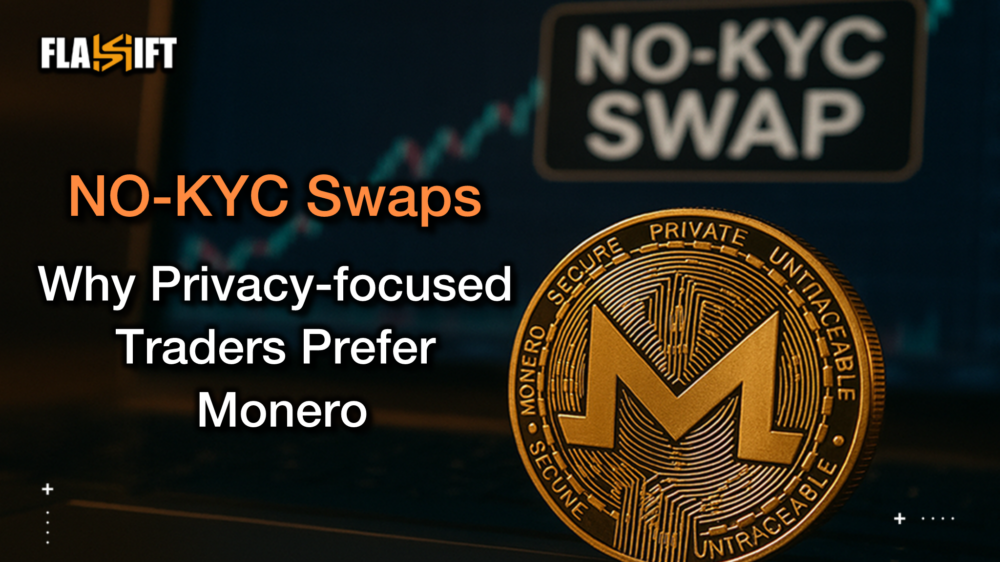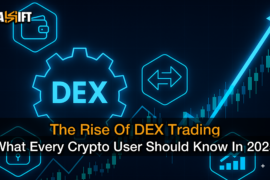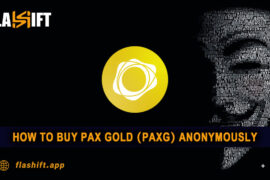No-KYC Crypto Swaps | You’ve just made a smart trade. A 20% gain overnight. You open your exchange app to cash out, only to be met with a dreaded message:
“Withdrawal Locked, Please Complete KYC Verification.”
Your funds? Frozen. Your ID? Requested. Your privacy? Gone.
For thousands of crypto users in 2025, this isn’t just a rare glitch; it’s an increasing threat. As centralized exchanges strengthen compliance, privacy-focused traders are turning to alternatives that provide freedom without friction. Central to this change is Monero (XMR)—a cryptocurrency designed specifically for anonymous transactions, and a thriving ecosystem of no-KYC swap services that allow you to trade without sacrificing control over your identity.
So what’s driving this movement? How safe is it? And is Monero untraceable? Let’s unpack the rise of privacy-first crypto swaps, and why more users are ditching traditional platforms for good.
No-KYC Crypto Swaps: Why Privacy-Focused Traders Prefer Monero
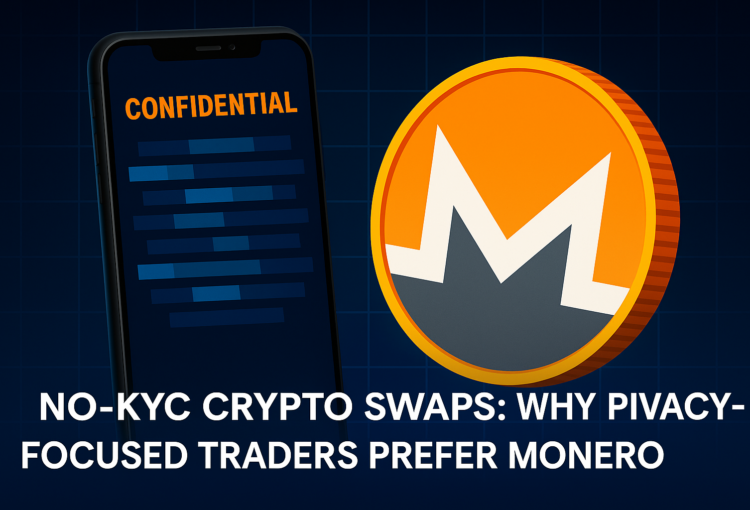
To answer, What are No-KYC Crypto Swaps? Flashift can tell you that, in their core, No-KYC crypto swaps are exactly what they sound like: cryptocurrency exchanges that don’t require Know Your Customer (KYC) verification. No ID upload. No selfie scan. No personal data trail.
These platforms allow users to swap one cryptocurrency for another, often across chains, without revealing their identity, a stark contrast to centralized exchanges (CEXs) like Binance or Coinbase, which are heavily regulated and enforce strict KYC policies.
How No-KYC Swaps Work
No-KYC swaps typically function in one of three ways:
- Decentralized Exchanges (DEXs): Platforms like Uniswap or ThorChain connect users directly via smart contracts. All you need is a wallet, no account, no paperwork.
- Cross-chain Swappers & Aggregators: Tools like Flashift, ChangeNOW, or SimpleSwap allow you to swap assets across blockchains using routing protocols, all while keeping your data off the table.
- Peer-to-Peer (P2P) Protocols: Some services match buyers and sellers directly, like in a crypto Craigslist, but automated and encrypted.
What’s common across all of them? Your wallet is your identity. And as long as you control your keys, you control your privacy.
Why They Exist
The rise of No-KYC services isn’t just about convenience, it’s a response to growing surveillance, aggressive regulatory crackdowns, and the weaponization of financial data. For many, they’re not just a preference, but a necessity.
Next, we’ll explore why Monero (XMR) has become the gold standard for privacy-focused traders in these no-KYC environments.
Why Traders Choose Monero (XMR) for Private Transactions
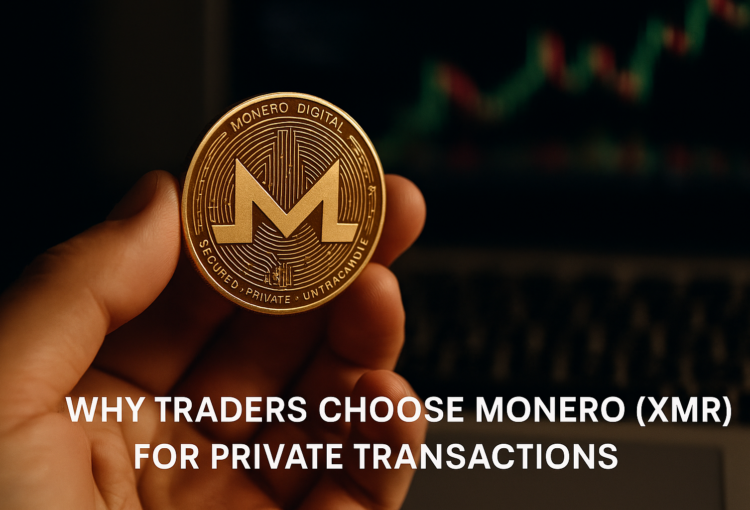
For anyone serious about financial privacy, Monero isn’t just a coin; it’s a philosophy. While many cryptocurrencies claim to be “decentralized” or “anonymous,” Monero stands out as one of the few truly privacy-preserving assets still thriving in 2025.
Monero’s Built-In Privacy: RingCT, Stealth Addresses, and Bulletproofs
Unlike Bitcoin or Ethereum, where transactions are fully visible on the public ledger, Monero hides everything:
- RingCT (Ring Confidential Transactions): Obscures the amount being sent by mixing it with others.
- Stealth Addresses: The recipient’s wallet address is never publicly linked to any transaction.
- Bulletproofs: Efficient zero-knowledge proofs that reduce transaction size while enhancing privacy.
This trifecta of features means you can send Monero without anyone knowing who you sent it to, how much you sent, or even that you sent it at all. And you don’t need to “turn on” privacy, it’s built in, by default.
Monero vs Bitcoin: Which Is More Anonymous in 2025?
Bitcoin is often misunderstood as anonymous. But in reality, it’s pseudo-anonymous; every transaction, address, and amount is stored forever on the blockchain. In 2025, chain analysis tools have become more powerful than ever, and even VPNs and mixers can’t fully hide your trail on BTC.
Monero, by contrast, remains untraceable by design. No matter how advanced the surveillance, XMR still protects sender, receiver, and amount, making it the privacy coin of choice for journalists, activists, and anyone living under oppressive regimes.
If Bitcoin is cash with a GPS tracker, Monero is the unmarked envelope.
XMR to BTC Instant Exchange with Lowest Fees
XMR Trading Volume Trends on No-KYC Platforms
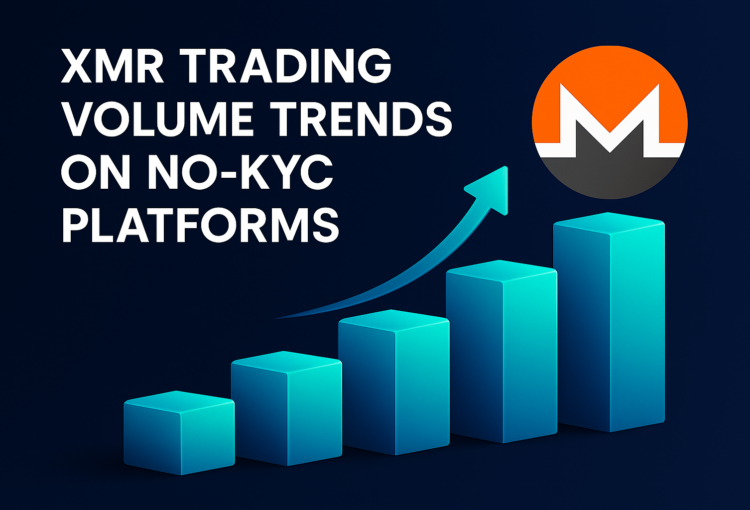
Monero continues to dominate No-KYC swap activity:
- Many cross-chain platforms now offer XMR pairs as their default privacy swap.
- Trading volume in Monero has surged on platforms like [Flashift], [SideShift], and [TradeOgre], especially as KYC enforcement expands elsewhere.
- In 2025, XMR ranks in the top 5 most-swapped coins on anonymous aggregators, often paired with USDT, ETH, or even stable privacy coins.
As users grow wary of centralized tracking and regulations tighten globally, Monero’s real utility is shining brighter than ever.
Risks and Security Considerations
Swapping crypto without KYC might feel like a breath of fresh air, until it isn’t. The freedom and privacy it offers also come with very real risks. In the no-KYC world, there’s no support ticket to save you if something goes wrong. That means being careful isn’t optional, it’s essential.
Scams, Fake Platforms, and Phishing Threats
Unfortunately, anonymity has become a double-edged sword. As the popularity of Monero and no-KYC swaps has grown, so has the number of fake platforms. Some sites look almost identical to trusted services, except for a minor typo in the URL. Others claim to offer instant swaps but quietly vanish with your funds. Worse yet, phishing pages disguised as wallet connectors can drain your assets the moment you click.
If a platform looks shady, feels rushed, or pushes you to act fast, walk away. You don’t get second chances in anonymous crypto.
How to Identify Trustworthy No-KYC Swap Services
Not all no-KYC platforms are equal. The ones worth using tend to speak clearly about their tech, have a stable online presence, and earn the trust of privacy-focused communities. Traders often turn to familiar names like Flashift or SimpleSwap, but even then, they double-check URLs and track record before swapping.
Look for signs of legitimacy: a transparent interface, clear terms, and no exaggerated promises. Ask yourself, does this feel like a platform that will still be around tomorrow?
Wallet Hygiene and Best Practices for Staying Anonymous
Privacy doesn’t stop at the swap. How you handle your wallet makes a big difference. Using a fresh wallet for each swap, avoiding address reuse, and separating CEX-connected funds from private holdings are all smart habits. It’s also a good idea to combine these with VPNs or Tor for extra protection.
True anonymity isn’t just about avoiding KYC—it’s about controlling your digital footprint. A few mindful steps can go a long way toward staying off the radar.
Future of Private Crypto Swapping
As global regulations tighten and surveillance becomes more advanced, privacy in crypto is shifting from a niche concern to a mainstream demand. Traders worldwide, especially in places with capital controls or strict KYC requirements, are seeking ways to maintain their financial freedom. So, what does the future hold for no-KYC swapping from here?
Will More Traders Migrate to Monero and No-KYC Platforms?
If current trends are any indicator, yes. In 2025, Monero continues to dominate the privacy coin narrative, not just among darknet users, but everyday investors who value discretion. As more centralized exchanges ramp up surveillance and introduce facial verification or location-based restrictions, a quiet shift is happening. Traders are moving to platforms that let them swap assets without exposing their identity.
Platforms like Flashift and others that support no-KYC Monero swaps are seeing growing usage, not just because of XMR’s features, but because people are becoming more educated about what’s at stake.
Upcoming Tech: Atomic Swaps, DEX Aggregators & Privacy Protocols
The future is also being built on-chain. Atomic swaps—trustless, peer-to-peer exchanges between different blockchains, are becoming more accessible and user-friendly. These swaps eliminate the need for intermediaries, offering pure privacy by design. Meanwhile, DEX aggregators are starting to incorporate privacy-focused routing, giving users better rates without compromising anonymity.
Add to that emerging protocols that shield wallet metadata or obfuscate transaction paths, and you get a privacy ecosystem that’s smarter and more resilient than ever before.
The Role of Decentralized Identity (DID) in Balancing Privacy & Compliance
Interestingly, the future might not be purely anonymous. The rise of decentralized identity (DID) systems suggests a hybrid approach, where users can verify their reputation or transaction history without revealing personal data. This could allow for selective transparency in DeFi and DEX trading, satisfying both users and regulators.
Imagine swapping Monero on a no-KYC platform, but still proving to a smart contract that you’re not a bot, scammer, or sanctioned entity—without giving up your name or passport. That’s the kind of balance DID aims to strike.
FAQs
-
What does “No-KYC” mean in crypto trading?
No-KYC (Know Your Customer) means a platform allows users to trade cryptocurrencies without collecting personal identification documents like passports, selfies, or proof of address. This protects user privacy and is popular among traders who value anonymity.
-
Is it legal to use No-KYC crypto swap services?
In many jurisdictions, using No-KYC platforms is not illegal—but it depends on your local regulations. Traders should always verify the legal standing of such services in their country and ensure they’re not breaking any compliance rules.
-
Why do privacy-focused users prefer Monero over Bitcoin?
Monero offers built-in privacy features like RingCT, stealth addresses, and Bulletproofs, making transactions untraceable and unlinkable. Bitcoin, by contrast, is pseudonymous—every transaction is publicly visible on the blockchain and can be linked through analysis.
-
Can I swap Monero (XMR) anonymously without registration?
Yes. Several No-KYC swap services, like Flashift and others, allow users to exchange XMR anonymously with no account required. These platforms typically use wallet-to-wallet swaps and don’t store user data.
-
Are No-KYC crypto platforms safe to use?
Some are, but many are not. Look for platforms with good reputations, visible team members (or long-standing anonymous teams), working support, and strong community feedback. Be cautious of phishing clones and fake URLs.
-
What’s the best way to stay anonymous when swapping Monero?
Use a privacy-respecting wallet, a VPN or Tor connection, and avoid reusing addresses. Don’t log into KYC exchanges from the same device or network. And never share your XMR wallet’s metadata or QR code publicly.
-
What is an atomic swap, and does it work with Monero?
An atomic swap is a trustless exchange of crypto between two parties, without a third-party custodian. Monero is slowly being integrated into atomic swap protocols, allowing truly decentralized and private cross-chain swaps with assets like Bitcoin.
-
Could future regulations ban No-KYC swaps?
Regulators may try, but enforcing such bans is challenging—especially with decentralized or peer-to-peer systems. The crypto privacy space is evolving with new technologies like decentralized identity (DID) to balance user rights and compliance.


